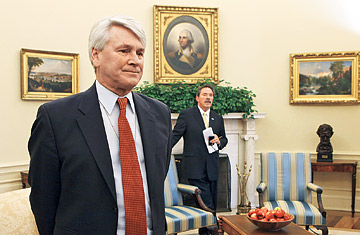
Obama turned to Craig to roll back Bush-era policies in the war on terrorism. But by September, Craig had been sidelined by pragmatists.
Nearly 100 days after Barack Obama entered office, his top White House lawyer, Greg Craig, braced the President's senior advisers for a potentially explosive development. The Administration was preparing to release photographs of suspected terrorists being abused in U.S. custody. On April 16, Craig asked chief of staff Rahm Emanuel to focus on the issue. Emanuel pleaded for more time to bury the release behind other news.
The White House made public its plans to release the photos seven days later, triggering a powerful reprisal inside and outside the Obama Administration. The images included those of U.S. soldiers pointing guns at one detainee's head and a broomstick at the backside of another. Obama's field commanders advised that U.S. troops would die in an extremist reprisal if the release went ahead. Secretary of Defense Robert Gates originally supported the release, then opposed it. Republicans pummeled Obama for taking unnecessary risks with national security. Even John Kerry publicly voiced concern about the fallout.
Less than three weeks later, Obama pulled a U-turn. When Craig walked into the Oval Office on Friday, May 8, for a hastily called meeting, the normally placid Obama was visibly unhappy. "I don't like my options," the President said. Craig told the President his lawyers had concluded there was no alternative to releasing the photos. Obama sent Craig scrambling for a new way out. Three days later, Craig had found a loophole: instead of releasing the photos, Obama would buy time by fighting their release all the way to the Supreme Court.
Interviews with two dozen current and former officials show that Obama's public decision to reverse himself and fight the release of the photographs signaled a behind-the-scenes turning point in his young presidency. Beginning in the first two weeks of May, Obama took harder lines on government secrecy, on the fate of prisoners at Guantánamo Bay and on the prosecution of terrorists worldwide. The President was moving away from some promises he had made during the campaign and toward more moderate positions, some favored by George W. Bush. At the same time, he quietly shifted responsibility for the legal framework for counterterrorism from Craig to political advisers overseen by Emanuel, who was more inclined to strike a balance between left and right.
The unseen struggle took place in the spring, but the results are emerging now. On Nov. 13, Attorney General Eric Holder unveiled plans to try Guantánamo Bay detainees in federal courts, as preferred by liberals, but he also announced he would try other suspected terrorists using extrajudicial proceedings out of Bush's playbook. The Administration is preparing to unveil its blueprint for closing the prison, but Obama will do so using some of the same Bush-era legal tools he once deplored.
The White House says Obama hasn't changed, just adjusted. "He and the Administration have adapted as we have learned more and the issues have evolved, but there has not been an ideological shift," says spokesman Ben LaBolt.
In any case, not everyone will be there for the next evolution. Last Friday, while the President was in Asia, Craig announced his resignation.
Revolt of the CIA Directors
